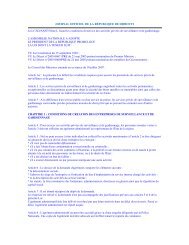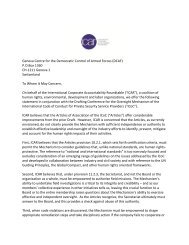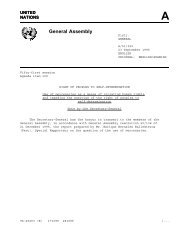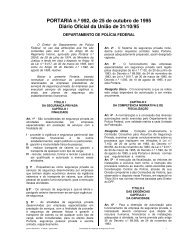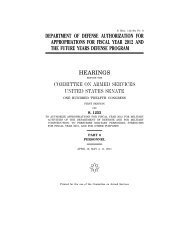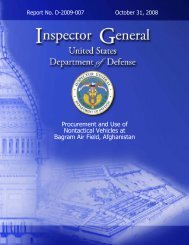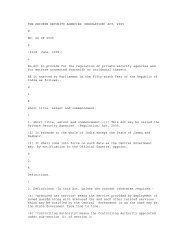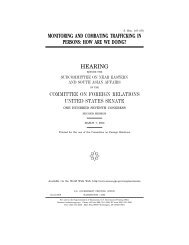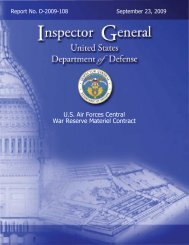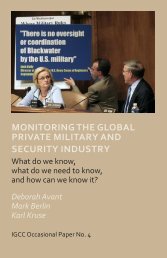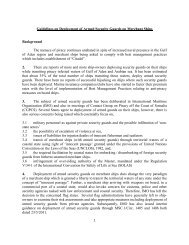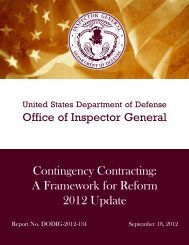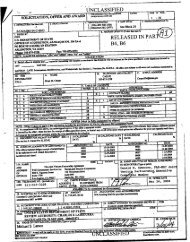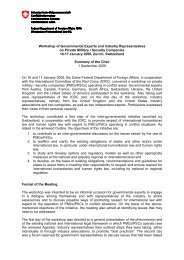Security Assistance; and Logistics - Federation of American Scientists
Security Assistance; and Logistics - Federation of American Scientists
Security Assistance; and Logistics - Federation of American Scientists
Create successful ePaper yourself
Turn your PDF publications into a flip-book with our unique Google optimized e-Paper software.
While some Iraqi Army mentoring <strong>and</strong> training was being provided by partneredCoalition medics, it was ad hoc <strong>and</strong> unfocused, <strong>and</strong> was a low priority since Iraqimentoring <strong>and</strong> training was a secondary duty to mentors’ primary role <strong>of</strong> Coalitionmedical care. Most Coalition medical activities with Iraqis were short-term projects,rather than focused on support <strong>of</strong> capability-building strategic programs, thus distractingfrom long-term capability development.<strong>Logistics</strong> Military <strong>Assistance</strong> TeamsMNSTC-I <strong>and</strong> MNC-I were developing <strong>Logistics</strong> Military <strong>Assistance</strong> Teams <strong>and</strong><strong>Logistics</strong> Training Advisory Teams to strengthen partnerships with the Iraqi Army toaccelerate development <strong>of</strong> a sustainable force. The <strong>Logistics</strong> Military <strong>Assistance</strong> Teammanning concept included one combat medic that would provide basic medical care tothe team.This medic’s secondary duties included mentoring Iraqi health personnel on aide stationoperations, providing emergency medical support for Iraqis, <strong>and</strong> providing oversight onmedical supply management. A tertiary duty was to advise, assist, <strong>and</strong> coordinate withhis Iraqi Army counterpart in support <strong>of</strong> current <strong>and</strong> future operations.We believe that the medical mentoring <strong>and</strong> advising functions that are needed to developa sustainable, effective Iraqi Army health care system will not be met by just one medicalmentor, for whom mentoring <strong>and</strong> advising are secondary or tertiary duties.Mentoring the Transition <strong>of</strong> Health Clinics to Iraqi Army ControlMNSTC-I mentoring <strong>of</strong> the efforts to transition health care clinics to Iraqi Army controlhad not been effective. Those efforts had brought to the surface significant procedural<strong>and</strong> process barriers within the Iraqi Army that prevented sustainable independentmedical operations.For example, Iraqi Army in-garrison clinics <strong>and</strong> medical units in support <strong>of</strong> operationalmaneuver units were under-staffed, <strong>and</strong> Iraqi Army personnel who were present were notbeing advised <strong>and</strong> mentored in their core duties. Medical equipment was improperlymaintained when present <strong>and</strong> supplies <strong>and</strong> pharmaceuticals were <strong>of</strong>ten not present whenneeded.The lack <strong>of</strong> mentors inhibited assuring that Iraqi Army medical personnel were in place<strong>and</strong> able to effectively work in the critical functional areas <strong>of</strong> medical logistics, medicalplans <strong>and</strong> operations, combat casualty care, in-garrison care, patient administration, <strong>and</strong>financial management.Coalition Air Force Training TeamWe believe that a strong mentoring team can be very effective. For example, intensivementoring <strong>of</strong> Iraqi Air Force aeromedical personnel over the past two years had resultedin demonstrable capability in casualty evacuation during recent operations in Basra. TheIraqi Air Force successfully transported 105 casualties from Basra to Baghdad.139



